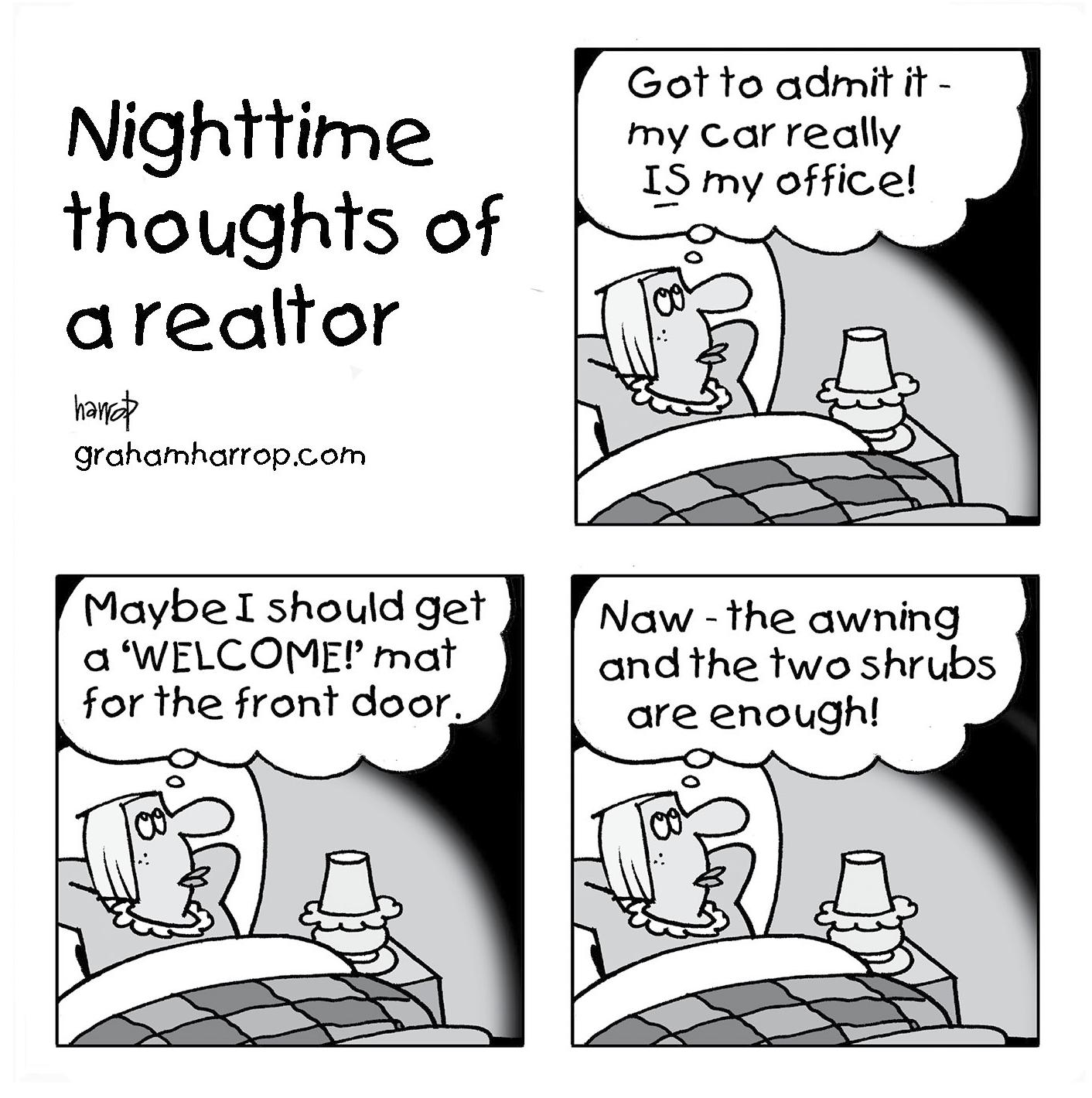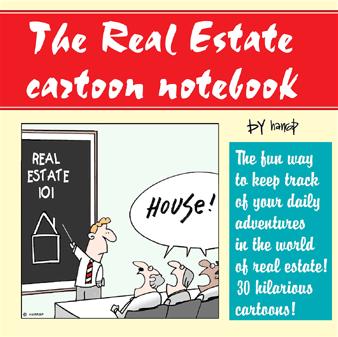






























Everything you do should be intentional. A busy schedule isn’t the same thing as a productive schedule. Sometimes people write things like “find clients” on their to-do list, but finding clients isn’t actually a task. It’s a goal. Your daily schedule should be created with your goal in mind if you want to be a successful real estate agent, but a goal is too broad to add to your calendar.
Instead, you can break your goal down into projects, break those projects down into tasks, and schedule time in your calendar to complete each task. You’ll find that some of these projects will have an immediate impact on your business, and that those are the tasks that should be completed first.
The fact is that as a real estate agent you can set your own schedule—if you’re not productive until 10am, then you don’t have to start your day until then. But having a daily schedule means that every day you have a running start on all those other agents who just “wing it.”
You don’t want to feel burned out and busy but like you’re simultaneously not getting a whole lot done. You can only keep up 70+ hour weeks for so long before your body breaks down and both your performance and income drop as a result.
Since every real estate agent’s operating hours look different, the following daily schedule is broken up by the suggested amount of hours you
should spend on each task rather than specific times of day. However, certain tasks, like prospecting, appointments, and listing presentations should be performed at times when it’s most convenient for clients. If you’re an agent who likes to end their workday at 5 o’clock, remember that this is also the same time your clients are likely ending their day, meaning you might be unavailable for showings during the only time their schedule allows.
1 hour – Spend this time waking up, exercising either at home or at the gym, and eating breakfast.
2 hours – Use this time before you head to the office to develop a morning routine, if you haven’t already. You can meditate, journal, practice affirmations, or read personal development books to prepare for the day ahead.
1 hour – Once you’re at the office, spend this time to review the day’s schedule, catch up with your assistant or other colleagues, and check the latest industry news. This is also the time of day that you can role play to prepare for appointments.
1.5 hours – Spend this time prospecting and appointment setting.
1 hour – Now it’s time for a lunch break. If you’re a multitasker, you can also use this time to prepare for the afternoon and any meetings you have scheduled or connect with followers on social media.
3.5 hours – This is that time of day that you should schedule all your appointments and listing presentations. If you are a newer agent, you might use this time instead to do more prospecting and appointment setting.
.5 hours – Look over the day’s schedule again and ensure you’ve checked every task off your to-do list. While you’re at it, be sure to review tomorrow’s schedule and goals too.
2 hours – Now it’s time to unwind. Use this time to have dinner and spend time with you family. If you have children, this is usually the time of day when they are wrapping up homework assignments and getting ready for bed. It’s important that you make time for these moments the same way you make time for your work.
2 hours – Spend these last couple hours before you fall asleep to have quality time with your spouse or perform your self-care routines.
8 hours – Now it’s time for sleep—getting a full night’s rest is crucial if you want every day to be productive.
As you can tell, there’s still some wiggle room left in this schedule, but the important thing is to block out time every day so you can achieve your goals and help your clients.



In real estate, where connections and maintaining relationships with clients are crucial, having a strong social media presence is essential for any REALTOR®. A wellcrafted agent profile on social platforms can not only showcase your expertise but
also help you connect with a wider audience, build trust, and ultimately grow your business. Here are some comprehensive agent-profile tips to elevate your social media presence and establish a strong online persona:
Your bio should introduce you as a real estate expert and spotlight your specialties, service areas, and what makes you unique. Include relevant keywords so you will rank high in a Google search.
It’s important to have a clear, high-definition photo of yourself. You should look professional, but at the same time approachable. Wear clothes that align with your brand, and keep the background simple.
Share your professional success, accomplishments, accreditations, and awards. This will enhance your credibility and make you appealing to potential clients. Those who visit your social media site will know you’re an expert.
Buying and selling real estate is a highly personal experience. It’s vital that you showcase your personality and relatability. Clients want to work with someone who they feel comfortable with. Incorporate your hobbies, personal anecdotes, and interests in your posts.
Whether you’re sponsoring an event, volunteering, or supporting local businesses, it’s beneficial to show your followers that you care for your community. It will help portray a positive brand image, and demonstrate a dedication to the areas you serve as a REALTOR®.
Produce varied and interesting content, balancing listings with insights into the market, news, and tips for buyers or sellers. This will keep your followers engaged and help solidify your status as a top expert in the field.
When people comment or message you, it’s important to respond. It’s also great to get conversations going on your social media pages by posing questions with your posts, running polls, or asking for opinions.
Post regularly on social media, at times when your audience is most active. This will ensure your posts are being seen by the largest audience possible. And when your followers know when to expect your posts, they will remember to check it out.
Offer a look into your everyday life in the real estate world, including preparing for open houses, client meetings, or your office setup. Maintaining an authentic presence will help you connect to your followers.
Take advantage of Instagram and Facebook’s Stories and Reels. This is where you can post more spontaneous and creative content. Some of the highest engagement on social media happens on these platforms.
Use hashtags that are relevant to what you’re posting. You can even create your own hashtag that reflects your brand. When you use a mix of the two, you’ll reach a larger audience.
Don’t be afraid to partner up with local businesses, industry influencers, and other professionals. You can cross-promote content and create content together. This will introduce you and your brand to new audiences.
Establish yourself as an expert by sharing knowledge about the real estate market,
process, or regulatory changes. Educating your audience not only demonstrates your expertise but also provides them with valuable information.
Feature positive feedback from satisfied clients. Testimonials build trust and provide social proof of your skills and commitment to client satisfaction. Consider creating visually appealing graphics or dedicated posts to showcase these testimonials.
Invest in high-quality visuals for your posts. Clear and appealing images are crucial in the real estate industry, whether you’re showcasing a property, sharing a personal story, or promoting your services. Professional visuals make a significant impact on social media platforms.
Remember, building a strong social media presence is an ongoing process that requires a blend of creativity, consistency, and genuine engagement. Regularly assess your analytics to understand what resonates with your audience, and adjust your strategy accordingly. By incorporating these agent-profile tips, you can effectively grow your social media presence, establish a meaningful connection with your current and potential clients, and differentiate yourself in the competitive real estate landscape.


Also licensed in North Carolina and Georgia, Top Agent Kelly Goggin operates The Goggin Group spanning South Carolina’s entire Grand Strand to Charleston.
From rubbing elbows with celebrities in Los Angeles as a private chef, to helping clients find their dream homes along South Carolina’s Grand Strand, Kelly Goggin’s path to becoming a top producer has been anything but ordinary. Kelly began her real estate journey 10 years ago in Scottsdale, Ariz., bringing a background in finance and business ownership to the table. She worked on the lending side before diving into the entrepreneurial world with her own restaurant & catering company. Her path then led her to Los Angeles, and eventually back to her roots in South Carolina. This unique blend of finance, business and high-profile clientele provided a solid foundation for her real estate career.
Now a full-time agent, Kelly operates The Goggin Group and emphasizes her
hands-on approach. Her expertise spans the entire Grand Strand to Charleston, and she’s also licensed in North Carolina and Georgia. “My family has been here for 50 years,” she says, highlighting her deep ties to Myrtle Beach. From the mid1980s through the early 2000s, Kelly’s family owned and operated the Myrtle Beach Aviation Center (then known as Ramp 66). Her commitment to her community has paid off—Kelly has been a top producer for two consecutive years. Her business thrives on repeat and referral clients. With ongoing referral business
in Los Angeles and Scottsdale, she handles about five or six transactions a year there, with $3 million in sales already in the 2025 pipeline in the Carolinas.
What sets Kelly apart? “I’m out there, and I have market knowledge and a strong finance, real estate and investment background,” she explains. Her experience as a licensed securities broker and her work with high-net-worth clients make her a natural fit for the luxury market. Nurturing relationships is key to Kelly’s strategy. She strengthens


Kelly has been a top producer for two consecutive years with her business thrives on repeat and referral clients as well as an ongoing referral business in Los Angeles and Scottsdale.
those relationships by staying in constant touch with past clients and maintaining a presence on social media platforms like LinkedIn, Instagram and TikTok.
Kelly also harnesses her membership in The International for Luxury Home
Marketing (ILHM) to promote her listings. “There are production benchmarks to be a member of this group,” she says, adding that this year she earned the top classification and is able to advertise free through the network. “It’s a great added feature to help reach luxury clientele,” she notes.
Kelly thrives on the art of negotiation. “I really love what I do because I love the negotiations,” she enthuses. Her ability to communicate effectively and her comprehensive background make her exceptionally good at helping clients achieve their goals. Yet her dedication extends beyond real estate. Her focus on food-related charities, pantries and other community initiatives highlights her commitment to giving back.
When she’s not closing deals, Kelly enjoys gardening and design, traveling
and exploring new markets. Skiing is another favorite pastime. Born in Texas and having lived in various places, Kelly’s love for travel keeps her inspired and informed. Kelly has no plans to slow down; she just listed her first commercial property in South Carolina and is looking to transition to a balanced mix of both residential and commercial. Networking also remains a priority. With referral listings spanning the nation and plans to network internationally, Kelly Goggin is poised for even greater success.




While we won’t be serenading a Carly Simon song or tugging on the heartstrings of a Hollywood heartthrob, we will be sharing ten essential tips for agents, the key pitfalls to avoid and the most common mistakes agents make that can cost them
a client. Whether you are a new agent or seasoned veteran in today’s market, get ready for ten insights from Top Agent Magazine. Sit down, grab your popcorn, and tune in to “How To Not Lose a Client in 10 Days!”
Agents who make it in real estate care about their clients’ welfare while guiding them through the homebuying journey.
Something we hear time and time again from agents featured in Top Agent Magazine is that their business and relationship with a client is not just about the transaction but more about devotion to serving their clients. Suppose a client suspects you are only eager for a quick commission versus their welfare; they may move on to a new agent who puts their welfare ahead of a transaction. Agents who make it in real estate care about their clients’ welfare while guiding them through the homebuying journey. If an agent is more transaction-focused than client-centric, this is a sure way to lose a client.
Never gloss over issues with a property. Be transparent with your client as you disclose everything you know about a property to protect the interest of a client and their family. When an agent openly communicates with their clients, whether a structural issue or faulty plumbing in the home, it prepares them
to understand the magnitude of what home repairs need addressing before purchasing. If an agent conceals property issues for their client to discover later, they may lose future business.
Failing to respond to your client may cause severe frustration. Your clients will have questions—point blank. The client relies on their agent as their voice of reason to distribute facts, relay progress, handle disruptions in the home buying process, and close the deal as seamlessly as possible. In a way, as an agent, you pledge to take on the stress. When you leave your clients without answers, they may not feel like a priority to you. Promptly return those phone calls and emails!
Agents must do their homework on a property to avoid losing potential customers and leads. Picture this - It’s an open house flooded with
potential clients, but you struggle to answer questions regarding the property accurately. Your potential client will be running for the hills! Conduct thorough research on the home and property, plunging into every detail from the construction date of the home to the specifics of the flooring. When your clients ask about the home, land, and local community, they expect you to inform them properly. Keep your leads impressed while you share your knowledgeable expertise about your listings so they feel secure in their home purchase.
Marketing properties sufficiently is critical for generating new leads and sales. Top agents effectively market their listings through email marketing, social media, print advertising, drone photography, and professional staging. For example, TV Personality from Selling Sunset and one of Southern California’s most well-known luxury real estate brokers featured on Top Agent Magazine’s cover, Jason Oppenheim from the Oppenheim Group, shares,

“We focus on the presentation of a property beforehand, and we even have a concierge service that can help get the home ready for sale. We really like to have a property looking as new as possible before we photograph and get them to market, so that often means staging, painting, landscaping, and sometimes a light remodel.” Implement Jason’s advice by employing
effective marketing strategies to have plenty of leads and prevent losing potential clients.
Lacking confidence in negotiation can give the impression that an agent needs a grip on the sale. Successful agents who know how to negotiate home prices find reward by keeping clients long-term while serving their clients’ best interests. A client will expect their agent to handle the negotiation aspects of the home buying process to give them the most favorable outcome. Poor negotiation skills can look like rushing, passivity, and lack of decision-making ability. On the other hand, a confident negotiator will have patience, assertion, and the ability to make decisions by articulating a client’s boundaries when discussing the closing price. You could miss out on future business or a five-star review if you don’t bring your A-game for your client.
Ignoring client feedback will result in client frustration and pose a significant risk of losing repeat and referral business. Constructive criticism from clients can be a guiding light to where an agent needs improvement in how they do business and, in the long term, may help refine an agent’s skills. Which agent doesn’t want to be the best version of themselves? Take advantage of your client’s advice to leverage it as an opportunity for career growth.
It is paramount that an agent is educated about present market trends and informed about the local real estate market.
Overpromising and under delivering is an easy way to taint your image and name in the business of real estate. To uphold your reputation among clients and industry peers, it’s crucial to fulfill the expectations you’ve committed to meeting. An agent should strive to be realistic when working with their client to avoid false hope or unrealistic results in the buying and selling process. Furthermore, it helps everyone prepare emotionally for potential obstacles in the homebuying process.
Putting pressure on your clients to make a decision when purchasing or selling their home is a big no-no. Not only is a home one of the most significant purchases most individuals make over their lifetime, but it is also where most spend the rest of their lives. For a client, these decisions can be challenging as they determine what their future home will look like. While guiding your client is valuable, it’s important to allow them to go at their own pace. Patience is a virtue, and professionalism is essential for a happy client.
It is paramount that an agent is educated about present market trends and informed about the local real estate market. Should an agent not prove they are up-to-date with the latest market knowledge, they risk looking unprofessional and unfit to represent a client. By knowing the state of the market, you become a proficient representative for your client. Additionally, you stay properly educated and may earn respect in the industry for your knowledge. Learning things like year-to-year home values, current interest rates, and home inventory stock, as well as the best time to list or purchase a home, will demonstrate to your clients that they are in good hands with an agent who holds vast knowledge of the real estate world.
In the competitive world of real estate, the success of your business relies on your clients’ loyalty and the prestige of your reputation. By implementing these rules into practice, you can avoid future challenges as you flourish in your business and cultivate enduring relationships with your clients for years to come.




Steering clear of these common home selling errors is essential for a seamless and effective transaction. Here are some top home-selling mistakes to avoid:

An experienced and compatible real estate agent is crucial. Select an agent with a strong performance history and knowledge of your local market.
Avoid setting an unrealistic asking price. Analyze the local market and similar properties to find a competitive and fair price.
Make necessary repairs and improvements to attract buyers. Addressing issues beforehand can make your home more appealing.
Proper staging is key. Declutter, depersonalize, and arrange furniture to highlight your home’s features.
First impressions are vital. Enhance your home’s exterior with maintenance, landscaping, and possibly a new paint job.
Expand beyond traditional marketing. Utilize online platforms and various channels to increase your home’s visibility.
Ensure your listing has high-quality photos. Attractive, clear images can significantly impact buyer interest.
Be transparent. Fully disclose the property’s condition to avoid potential legal complications.
Maintain a business perspective. Emotional attachment can complicate the selling process.
Understanding current market dynamics can guide your decisions regarding pricing and the best time to sell.
Openness in negotiations can facilitate a sale. Be willing to consider reasonable offers and compromises.
Maintain a show-ready home at all times. A tidy and clean environment can make a strong impression during unexpected showings.
By avoiding these common mistakes, you can increase your chances of selling your home quickly and at a satisfactory price.

The real estate world can be an industry of intense emotional and psychological pressure. Deadlines, meetings, employee needs, client needs and a hundred other items on which one needs to focus on a daily basis can create an environment that is not only not conducive to mental well-being, but can be outright detrimental.
Learning to quiet the mind has been the focus of meditation for millennia. While those not familiar with the concept of meditation may instinctively think of yoga mats, incense, and chanting when the word “meditation” arises, there are in fact, many forms of meditation that can integrate quite
easily into the daily hustle & bustle world of the busy real estate agent.
First, think about when you are alone each day. Here are some possible times to practice mediation during the work day:
• When driving to the office in the morning
• When driving to a showing or to meet a client
• Before your open house begins
• After the open house
• Driving home in the evening
Repeating a mantra can be very calming, particularly when you are trying to rid yourself of negative, self-defeating thoughts.
These are just five examples of times when you can take advantage of meditation techniques to quiet your mind and, by extension, increase productivity. A calm mind is a more thoughtful, better tuned instrument.
Here are some examples of meditations you can try:
1 For when you’re driving, download and listen to any number of audio Guided Meditations available on the internet. YouTube has a generous selection of these, many of which are geared towards success in business.
2 Repeating a mantra can be very calming, particularly when you are trying to rid yourself of negative, self-defeating thoughts. It doesn’t matter what words you choose, as long as you feel good about your choice. “I am a success” or “I will approach all of my clients with love today” are two examples. Whatever works for you and gets you into the desired mindset.
3 Something as simple as listening to pleasant music in your car can be considered meditation, provided it brings you to a place of comfort as opposed to one of spiritual discordance.
4 The most important thing, however, is to take time to find gratitude in everything you do. Count your blessings, be grateful the exciting career in real estate you have built for yourself.
Once you’ve mastered some of these techniques at quieting your mind, you can attempt to find some that work even better for you. Walking, plain silence, or even exercise can have meditative qualities and benefits if practiced on a regular basis.
When you’re truly feeling calm, your clients can sense this. And with this comes the feeling that you can be relied upon to stay focused and calm in any unforeseen circumstances. And in the world of real estate, that’s a highly prized commodity.
